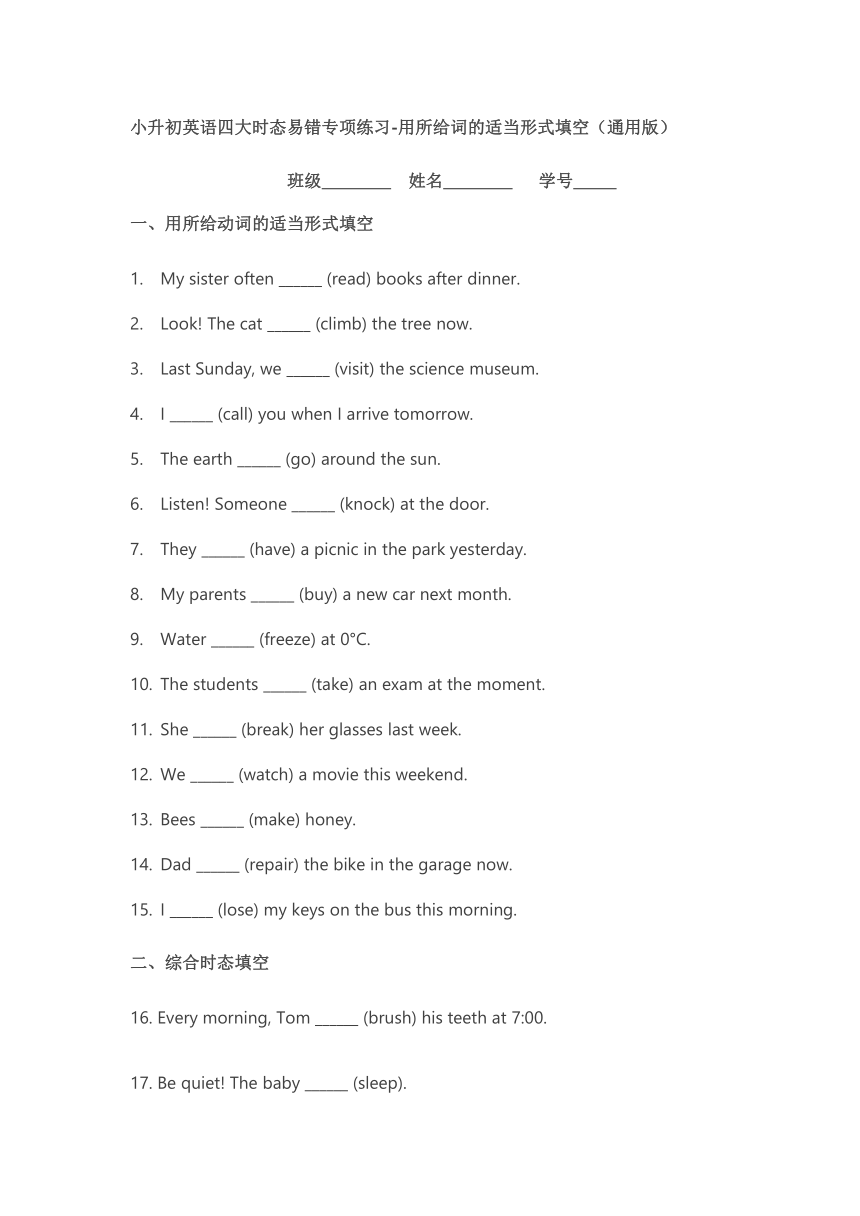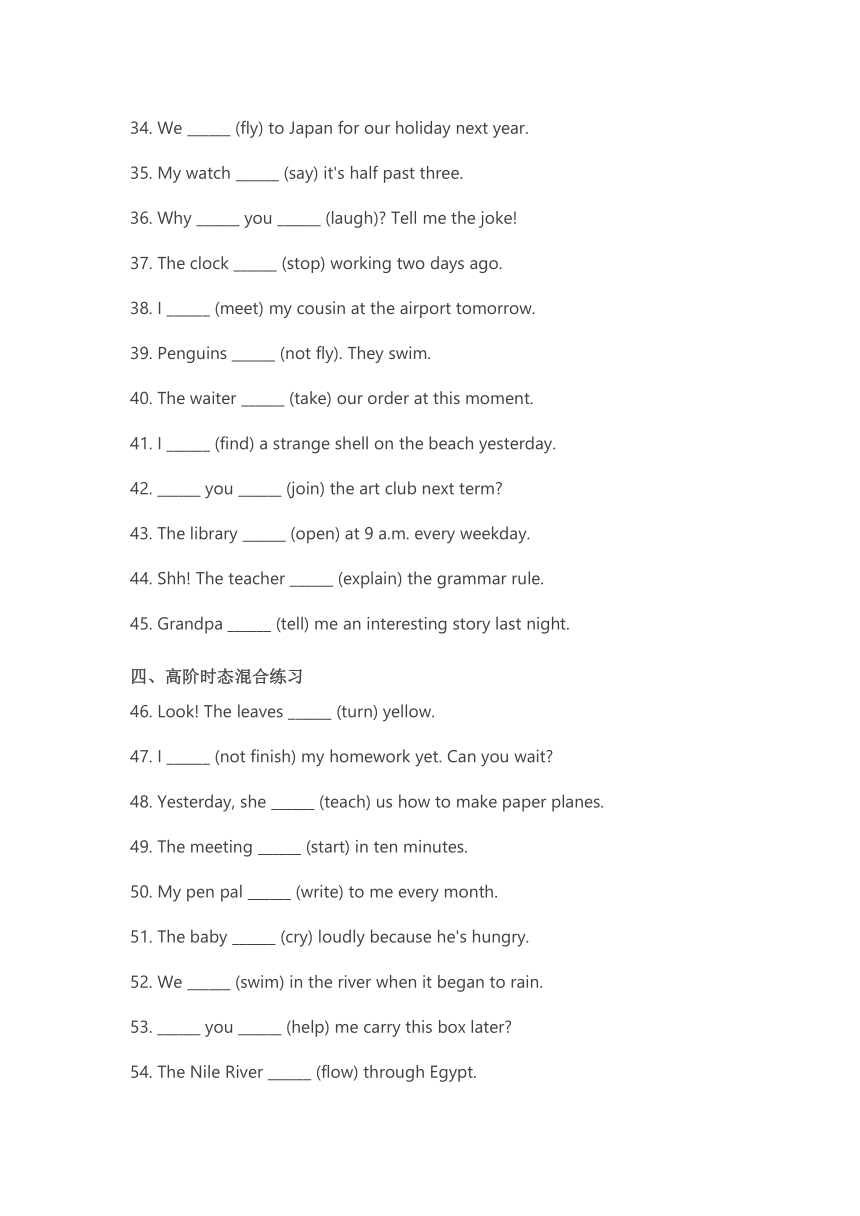外研版(一年级起点)通用版小升初英语四大时态易错专项练习-用所给词的适当形式填空(含解析)
文档属性
| 名称 | 外研版(一年级起点)通用版小升初英语四大时态易错专项练习-用所给词的适当形式填空(含解析) |  | |
| 格式 | doc | ||
| 文件大小 | 62.5KB | ||
| 资源类型 | 教案 | ||
| 版本资源 | 外研版(一年级起点) | ||
| 科目 | 英语 | ||
| 更新时间 | 2025-02-17 17:51:54 | ||
图片预览



文档简介
小升初英语四大时态易错专项练习-用所给词的适当形式填空(通用版)
班级 姓名 学号
一、用所给动词的适当形式填空
My sister often ______ (read) books after dinner.
Look! The cat ______ (climb) the tree now.
Last Sunday, we ______ (visit) the science museum.
I ______ (call) you when I arrive tomorrow.
The earth ______ (go) around the sun.
Listen! Someone ______ (knock) at the door.
They ______ (have) a picnic in the park yesterday.
My parents ______ (buy) a new car next month.
Water ______ (freeze) at 0°C.
The students ______ (take) an exam at the moment.
She ______ (break) her glasses last week.
We ______ (watch) a movie this weekend.
Bees ______ (make) honey.
Dad ______ (repair) the bike in the garage now.
I ______ (lose) my keys on the bus this morning.
二、综合时态填空
16. Every morning, Tom ______ (brush) his teeth at 7:00.
17. Be quiet! The baby ______ (sleep).
18. Lucy ______ (win) the chess competition last year.
19. The train ______ (leave) at 8:15 pm tonight.
20. Look at the clouds! It ______ (rain) soon.
21. My grandma ______ (cook) soup when I called her.
22. Kangaroos ______ (live) in Australia.
23. The phone ______ (ring) while I was taking a shower.
24. I promise I ______ (not forget) your birthday.
25. The sun ______ (rise) in the east every day.
26. Hurry up! The bus ______ (come).
27. Jack ______ (fall) off his bike yesterday.
28. They ______ (plant) trees in the park next week.
29. Usually, Mom ______ (wash) clothes on Sundays.
30. The chef ______ (prepare) sushi right now.
三、易错时态强化
31. My brother never ______ (eat) broccoli.
32. The children ______ (build) a sandcastle now.
33. I ______ (see) a rainbow after the rain stopped.
34. We ______ (fly) to Japan for our holiday next year.
35. My watch ______ (say) it's half past three.
36. Why ______ you ______ (laugh) Tell me the joke!
37. The clock ______ (stop) working two days ago.
38. I ______ (meet) my cousin at the airport tomorrow.
39. Penguins ______ (not fly). They swim.
40. The waiter ______ (take) our order at this moment.
41. I ______ (find) a strange shell on the beach yesterday.
42. ______ you ______ (join) the art club next term
43. The library ______ (open) at 9 a.m. every weekday.
44. Shh! The teacher ______ (explain) the grammar rule.
45. Grandpa ______ (tell) me an interesting story last night.
四、高阶时态混合练习
46. Look! The leaves ______ (turn) yellow.
47. I ______ (not finish) my homework yet. Can you wait
48. Yesterday, she ______ (teach) us how to make paper planes.
49. The meeting ______ (start) in ten minutes.
50. My pen pal ______ (write) to me every month.
51. The baby ______ (cry) loudly because he's hungry.
52. We ______ (swim) in the river when it began to rain.
53. ______ you ______ (help) me carry this box later
54. The Nile River ______ (flow) through Egypt.
55. I ______ (cut) my finger while cooking yesterday.
56. The astronauts ______ (travel) to Mars in 2030.
57. Be careful! The floor ______ (be) wet.
58. Last winter, it ______ (snow) heavily for three days.
59. I ______ (send) you the photos as soon as possible.
60. The lion ______ (hunt) for food at night usually.
答案解析
1. reads。“often”表明是一般现在时,主语“My sister”是第三人称单数,动词用第三人称单数形式。
2. is climbing。“Look!”提示此刻动作正在进行,用现在进行时“be +动词现在分词”,主语“The cat”是单数,be动词用is。
3. visited。“Last Sunday”是一般过去时的标志,动词用过去式。
4. will call。“when”引导时间状语从句,遵循“主将从现”原则,从句“when I arrive tomorrow”是一般现在时表将来,主句用一般将来时“will +动词原形”。
5. goes。“地球围绕太阳转”是客观真理,用一般现在时,主语“The earth”是第三人称单数,动词用第三人称单数形式。
6. is knocking。“Listen!”表明动作正在发生,用现在进行时,主语“Someone”视为单数,be动词用is。
7. had。“yesterday”表明是一般过去时,动词用过去式。
8. will buy。“next month”是一般将来时的标志,用“will +动词原形”表示将来的动作。
9. freezes。“水在0°C结冰”是客观事实,用一般现在时,主语“Water”是不可数名词,视为第三人称单数,动词用第三人称单数形式。
10. are taking。“at the moment”表示此刻,用现在进行时,主语“The students”是复数,be动词用are。
11. broke。“last week”是一般过去时的标志,动词用过去式。
12. will watch。“this weekend”表示将来,用一般将来时“will +动词原形”。
13. make。“蜜蜂酿蜜”是客观事实,用一般现在时,主语“Bees”是复数,动词用原形。
14. is repairing。“now”表明动作正在进行,用现在进行时,主语“Dad”是单数,be动词用is。
15. lost。“this morning”表明是过去发生的动作,用一般过去时,动词用过去式。
16. brushes。“Every morning”是一般现在时的标志,主语“Tom”是第三人称单数,动词用第三人称单数形式。
17. is sleeping。“Be quiet!”提示此刻宝宝正在睡觉,用现在进行时,主语“The baby”是单数,be动词用is。
18. won。“last year”表明是一般过去时,动词用过去式。
19. leaves。“火车今晚8:15离开”是按照时刻表安排的将来动作,用一般现在时表将来,主语“The train”是第三人称单数,动词用第三人称单数形式。
20. is going to rain。“Look at the clouds!”表明有迹象显示即将下雨,用“be going to +动词原形”表示有迹象表明即将发生的动作,主语“It”是单数,be动词用is。
21. was cooking。“when I called her”表明过去某个时间点“我打电话”时,奶奶“煮汤”的动作正在进行,用过去进行时“was/were +动词现在分词”,主语“My grandma”是单数,be动词用was。
22. live。“袋鼠生活在澳大利亚”是客观事实,用一般现在时,主语“Kangaroos”是复数,动词用原形。
23. rang。“while I was taking a shower”表示过去某个时间段,“电话响”是在这个时间段内发生的短暂动作,用一般过去时,动词用过去式。
24. won't forget。“promise”表示承诺,“我不会忘记你的生日”是将来的动作,用一般将来时的否定形式“won't +动词原形”。
25. rises。“太阳每天从东方升起”是客观真理,用一般现在时,主语“The sun”是第三人称单数,动词用第三人称单数形式。
26. is coming。“Hurry up!”提示公交车即将到来,用现在进行时表将来,主语“The bus”是单数,be动词用is。
27. fell。“yesterday”表明是一般过去时,动词用过去式。
28. will plant。“next week”是一般将来时的标志,用“will +动词原形”表示将来的动作。
29. washes。“Usually”和“on Sundays”表明是习惯性动作,用一般现在时,主语“Mom”是第三人称单数,动词用第三人称单数形式。
30. is preparing。“right now”表明此刻动作正在进行,用现在进行时,主语“The chef”是单数,be动词用is。
31. eats。“never”表明是一般现在时的否定习惯表达,主语“My brother”是第三人称单数,动词用第三人称单数形式。
32. are building。“now”表明动作正在进行,用现在进行时,主语“The children”是复数,be动词用are。
33. saw。“after the rain stopped”表明“看见彩虹”是在雨停之后的过去动作,用一般过去时,动词用过去式。
34. will fly。“next year”是一般将来时的标志,用“will +动词原形”表示将来的动作。
35. says。“我的手表显示”是一般现在时的客观描述,主语“My watch”是第三人称单数,动词用第三人称单数形式。
36. are; laughing。根据语境可知询问此刻正在笑的原因,用现在进行时,主语是you,be动词用are。
37. stopped。“two days ago”表明是一般过去时,动词用过去式。
38. will meet。“tomorrow”是一般将来时的标志,用“will +动词原形”表示将来的动作。
39. don't fly。“企鹅不会飞”是客观事实,用一般现在时的否定形式,主语“Penguins”是复数,借助助动词don't构成否定,动词用原形。
40. is taking。“at this moment”表明此刻动作正在进行,用现在进行时,主语“The waiter”是单数,be动词用is。
41. found。“yesterday”表明是一般过去时,动词用过去式。
42. Will; join。“next term”是一般将来时的标志,一般将来时的一般疑问句把will提到句首,动词用原形。
43. opens。“every weekday”表明是习惯性动作,用一般现在时,主语“The library”是第三人称单数,动词用第三人称单数形式。
44. is explaining。“Shh!”提示此刻老师正在讲解,用现在进行时,主语“The teacher”是单数,be动词用is。
45. told。“last night”表明是一般过去时,动词用过去式。
46. are turning。“Look!”表明此刻树叶正在变黄,用现在进行时,主语“The leaves”是复数,be动词用are。
47. haven't finished。“yet”是现在完成时的标志,现在完成时的否定结构是“haven't/hasn't +动词过去分词”,主语是I,用haven't。
48. taught。“Yesterday”表明是一般过去时,动词用过去式。
49. will start。“in ten minutes”表示“十分钟后”,是一般将来时的标志,用“will +动词原形”表示将来的动作。
50. writes。“every month”表明是习惯性动作,用一般现在时,主语“My pen pal”是第三人称单数,动词用第三人称单数形式。
51. is crying。根据语境“宝宝因为饿了正在大哭”,用现在进行时,主语“The baby”是单数,be动词用is。
52. were swimming。“when it began to rain”表明过去某个时间点“开始下雨”时,“我们游泳”的动作正在进行,用过去进行时,主语“We”是复数,be动词用were。
53. Will; help。“later”表示将来,一般将来时的一般疑问句把will提到句首,动词用原形。
54. flows。“尼罗河穿过埃及”是客观事实,用一般现在时,主语“The Nile River”是第三人称单数,动词用第三人称单数形式。
55. cut。“yesterday”表明是一般过去时,cut的过去式还是cut。
56. will travel。“in 2030”是一般将来时的标志,用“will +动词原形”表示将来的动作。
57. is。“Be careful!”提示此刻地板是湿的,用一般现在时,主语“The floor”是单数,be动词用is。
58. snowed。“Last winter”表明是一般过去时,动词用过去式。
59. will send。“as soon as possible”表示“尽快”,是将来的动作,用一般将来时“will +动词原形”。
60. hunts。“usually”表明是习惯性动作,用一般现在时,主语“The lion”是第三人称单数,动词用第三人称单数形式 。
班级 姓名 学号
一、用所给动词的适当形式填空
My sister often ______ (read) books after dinner.
Look! The cat ______ (climb) the tree now.
Last Sunday, we ______ (visit) the science museum.
I ______ (call) you when I arrive tomorrow.
The earth ______ (go) around the sun.
Listen! Someone ______ (knock) at the door.
They ______ (have) a picnic in the park yesterday.
My parents ______ (buy) a new car next month.
Water ______ (freeze) at 0°C.
The students ______ (take) an exam at the moment.
She ______ (break) her glasses last week.
We ______ (watch) a movie this weekend.
Bees ______ (make) honey.
Dad ______ (repair) the bike in the garage now.
I ______ (lose) my keys on the bus this morning.
二、综合时态填空
16. Every morning, Tom ______ (brush) his teeth at 7:00.
17. Be quiet! The baby ______ (sleep).
18. Lucy ______ (win) the chess competition last year.
19. The train ______ (leave) at 8:15 pm tonight.
20. Look at the clouds! It ______ (rain) soon.
21. My grandma ______ (cook) soup when I called her.
22. Kangaroos ______ (live) in Australia.
23. The phone ______ (ring) while I was taking a shower.
24. I promise I ______ (not forget) your birthday.
25. The sun ______ (rise) in the east every day.
26. Hurry up! The bus ______ (come).
27. Jack ______ (fall) off his bike yesterday.
28. They ______ (plant) trees in the park next week.
29. Usually, Mom ______ (wash) clothes on Sundays.
30. The chef ______ (prepare) sushi right now.
三、易错时态强化
31. My brother never ______ (eat) broccoli.
32. The children ______ (build) a sandcastle now.
33. I ______ (see) a rainbow after the rain stopped.
34. We ______ (fly) to Japan for our holiday next year.
35. My watch ______ (say) it's half past three.
36. Why ______ you ______ (laugh) Tell me the joke!
37. The clock ______ (stop) working two days ago.
38. I ______ (meet) my cousin at the airport tomorrow.
39. Penguins ______ (not fly). They swim.
40. The waiter ______ (take) our order at this moment.
41. I ______ (find) a strange shell on the beach yesterday.
42. ______ you ______ (join) the art club next term
43. The library ______ (open) at 9 a.m. every weekday.
44. Shh! The teacher ______ (explain) the grammar rule.
45. Grandpa ______ (tell) me an interesting story last night.
四、高阶时态混合练习
46. Look! The leaves ______ (turn) yellow.
47. I ______ (not finish) my homework yet. Can you wait
48. Yesterday, she ______ (teach) us how to make paper planes.
49. The meeting ______ (start) in ten minutes.
50. My pen pal ______ (write) to me every month.
51. The baby ______ (cry) loudly because he's hungry.
52. We ______ (swim) in the river when it began to rain.
53. ______ you ______ (help) me carry this box later
54. The Nile River ______ (flow) through Egypt.
55. I ______ (cut) my finger while cooking yesterday.
56. The astronauts ______ (travel) to Mars in 2030.
57. Be careful! The floor ______ (be) wet.
58. Last winter, it ______ (snow) heavily for three days.
59. I ______ (send) you the photos as soon as possible.
60. The lion ______ (hunt) for food at night usually.
答案解析
1. reads。“often”表明是一般现在时,主语“My sister”是第三人称单数,动词用第三人称单数形式。
2. is climbing。“Look!”提示此刻动作正在进行,用现在进行时“be +动词现在分词”,主语“The cat”是单数,be动词用is。
3. visited。“Last Sunday”是一般过去时的标志,动词用过去式。
4. will call。“when”引导时间状语从句,遵循“主将从现”原则,从句“when I arrive tomorrow”是一般现在时表将来,主句用一般将来时“will +动词原形”。
5. goes。“地球围绕太阳转”是客观真理,用一般现在时,主语“The earth”是第三人称单数,动词用第三人称单数形式。
6. is knocking。“Listen!”表明动作正在发生,用现在进行时,主语“Someone”视为单数,be动词用is。
7. had。“yesterday”表明是一般过去时,动词用过去式。
8. will buy。“next month”是一般将来时的标志,用“will +动词原形”表示将来的动作。
9. freezes。“水在0°C结冰”是客观事实,用一般现在时,主语“Water”是不可数名词,视为第三人称单数,动词用第三人称单数形式。
10. are taking。“at the moment”表示此刻,用现在进行时,主语“The students”是复数,be动词用are。
11. broke。“last week”是一般过去时的标志,动词用过去式。
12. will watch。“this weekend”表示将来,用一般将来时“will +动词原形”。
13. make。“蜜蜂酿蜜”是客观事实,用一般现在时,主语“Bees”是复数,动词用原形。
14. is repairing。“now”表明动作正在进行,用现在进行时,主语“Dad”是单数,be动词用is。
15. lost。“this morning”表明是过去发生的动作,用一般过去时,动词用过去式。
16. brushes。“Every morning”是一般现在时的标志,主语“Tom”是第三人称单数,动词用第三人称单数形式。
17. is sleeping。“Be quiet!”提示此刻宝宝正在睡觉,用现在进行时,主语“The baby”是单数,be动词用is。
18. won。“last year”表明是一般过去时,动词用过去式。
19. leaves。“火车今晚8:15离开”是按照时刻表安排的将来动作,用一般现在时表将来,主语“The train”是第三人称单数,动词用第三人称单数形式。
20. is going to rain。“Look at the clouds!”表明有迹象显示即将下雨,用“be going to +动词原形”表示有迹象表明即将发生的动作,主语“It”是单数,be动词用is。
21. was cooking。“when I called her”表明过去某个时间点“我打电话”时,奶奶“煮汤”的动作正在进行,用过去进行时“was/were +动词现在分词”,主语“My grandma”是单数,be动词用was。
22. live。“袋鼠生活在澳大利亚”是客观事实,用一般现在时,主语“Kangaroos”是复数,动词用原形。
23. rang。“while I was taking a shower”表示过去某个时间段,“电话响”是在这个时间段内发生的短暂动作,用一般过去时,动词用过去式。
24. won't forget。“promise”表示承诺,“我不会忘记你的生日”是将来的动作,用一般将来时的否定形式“won't +动词原形”。
25. rises。“太阳每天从东方升起”是客观真理,用一般现在时,主语“The sun”是第三人称单数,动词用第三人称单数形式。
26. is coming。“Hurry up!”提示公交车即将到来,用现在进行时表将来,主语“The bus”是单数,be动词用is。
27. fell。“yesterday”表明是一般过去时,动词用过去式。
28. will plant。“next week”是一般将来时的标志,用“will +动词原形”表示将来的动作。
29. washes。“Usually”和“on Sundays”表明是习惯性动作,用一般现在时,主语“Mom”是第三人称单数,动词用第三人称单数形式。
30. is preparing。“right now”表明此刻动作正在进行,用现在进行时,主语“The chef”是单数,be动词用is。
31. eats。“never”表明是一般现在时的否定习惯表达,主语“My brother”是第三人称单数,动词用第三人称单数形式。
32. are building。“now”表明动作正在进行,用现在进行时,主语“The children”是复数,be动词用are。
33. saw。“after the rain stopped”表明“看见彩虹”是在雨停之后的过去动作,用一般过去时,动词用过去式。
34. will fly。“next year”是一般将来时的标志,用“will +动词原形”表示将来的动作。
35. says。“我的手表显示”是一般现在时的客观描述,主语“My watch”是第三人称单数,动词用第三人称单数形式。
36. are; laughing。根据语境可知询问此刻正在笑的原因,用现在进行时,主语是you,be动词用are。
37. stopped。“two days ago”表明是一般过去时,动词用过去式。
38. will meet。“tomorrow”是一般将来时的标志,用“will +动词原形”表示将来的动作。
39. don't fly。“企鹅不会飞”是客观事实,用一般现在时的否定形式,主语“Penguins”是复数,借助助动词don't构成否定,动词用原形。
40. is taking。“at this moment”表明此刻动作正在进行,用现在进行时,主语“The waiter”是单数,be动词用is。
41. found。“yesterday”表明是一般过去时,动词用过去式。
42. Will; join。“next term”是一般将来时的标志,一般将来时的一般疑问句把will提到句首,动词用原形。
43. opens。“every weekday”表明是习惯性动作,用一般现在时,主语“The library”是第三人称单数,动词用第三人称单数形式。
44. is explaining。“Shh!”提示此刻老师正在讲解,用现在进行时,主语“The teacher”是单数,be动词用is。
45. told。“last night”表明是一般过去时,动词用过去式。
46. are turning。“Look!”表明此刻树叶正在变黄,用现在进行时,主语“The leaves”是复数,be动词用are。
47. haven't finished。“yet”是现在完成时的标志,现在完成时的否定结构是“haven't/hasn't +动词过去分词”,主语是I,用haven't。
48. taught。“Yesterday”表明是一般过去时,动词用过去式。
49. will start。“in ten minutes”表示“十分钟后”,是一般将来时的标志,用“will +动词原形”表示将来的动作。
50. writes。“every month”表明是习惯性动作,用一般现在时,主语“My pen pal”是第三人称单数,动词用第三人称单数形式。
51. is crying。根据语境“宝宝因为饿了正在大哭”,用现在进行时,主语“The baby”是单数,be动词用is。
52. were swimming。“when it began to rain”表明过去某个时间点“开始下雨”时,“我们游泳”的动作正在进行,用过去进行时,主语“We”是复数,be动词用were。
53. Will; help。“later”表示将来,一般将来时的一般疑问句把will提到句首,动词用原形。
54. flows。“尼罗河穿过埃及”是客观事实,用一般现在时,主语“The Nile River”是第三人称单数,动词用第三人称单数形式。
55. cut。“yesterday”表明是一般过去时,cut的过去式还是cut。
56. will travel。“in 2030”是一般将来时的标志,用“will +动词原形”表示将来的动作。
57. is。“Be careful!”提示此刻地板是湿的,用一般现在时,主语“The floor”是单数,be动词用is。
58. snowed。“Last winter”表明是一般过去时,动词用过去式。
59. will send。“as soon as possible”表示“尽快”,是将来的动作,用一般将来时“will +动词原形”。
60. hunts。“usually”表明是习惯性动作,用一般现在时,主语“The lion”是第三人称单数,动词用第三人称单数形式 。
